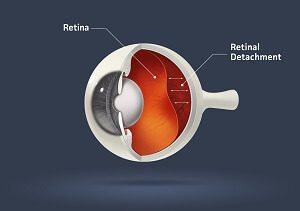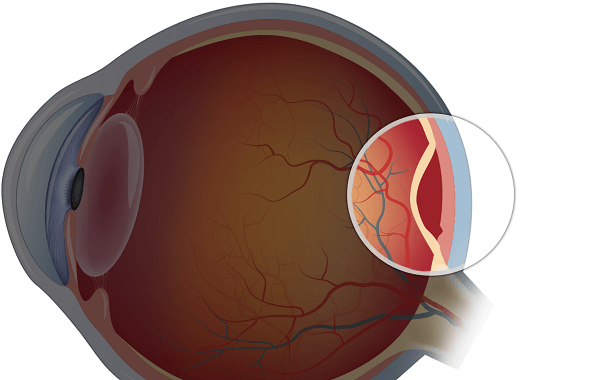Detached Retina Surgery Cost
Last Updated on July 26, 2022
Written by CPA Alec Pow | Content Reviewed by ![]() CFA Alexander Popinker
CFA Alexander Popinker
Retinal detachment occurs when the retina separates from the back of the eye. This causes vision loss that can be partial or total, depending on how much of the retina is detached. When your retina detaches, its cells can be severely deprived of oxygen and blood supply. Without a supply of blood, the retinal cells will begin to die. It is a serious eye condition because undetected and untreated quickly, it leads to vision loss.
The treatment is strictly surgical and aims to stabilize the rupture and restore the retina. However, if the rupture has affected the central part of the retina (macula), vision will be compromised even if the surgery was performed successfully.
How Much Does Detached Retina Surgery Cost?
In case you don’t have any type of health insurance, you should be prepared to spend anywhere between $2,500 and $10,000 per eye for detached retina surgery, depending on the type of procedure, whether it is outpatient or not, the method that is used, the professional who performs the surgery and the place where you live. The expenses of the operating room and the hospital fees should be included in this price average, but all the billing policies are different from one another and may vary from one clinic to another. Though, in all cases, before confirming the surgery you will have to go through an eye exam that will cost anywhere between $75 and $150, depending on the place where you are living and the doctor you choose.
You might also like our articles on the cost of Lasik eye surgery, Strabismus surgery, or BrightOcular surgery.
On the MayoClinic website is stated that the cost of detached retina surgery is anywhere between $6,500 and $9,500, depending on the geographical location.
On the other hand, if you have a health insurance policy, the cost of detached retina surgery will be covered only if it is deemed medically necessary. Make sure you contact your health insurance provider and ask about what is covered. You may only be responsible for co-pays and deductibles.
Detached retina surgery details
 There are several types of surgery to repair a detached retina. It can be treated by frost, called cryotherapy, or by a laser procedure. Different types of retinal detachment require different types of surgery and different levels of anesthesia. The type of procedure your doctor prepares will depend on the severity of the retinal detachment.
There are several types of surgery to repair a detached retina. It can be treated by frost, called cryotherapy, or by a laser procedure. Different types of retinal detachment require different types of surgery and different levels of anesthesia. The type of procedure your doctor prepares will depend on the severity of the retinal detachment.
The surgery is performed under local anesthesia. It can take 1 hour or longer. The surgery is performed under a microscope and with the help of several fine instruments the surgeon will remove the vitreous, as well as any scarred tissue or foreign bodies from the eyes.
To fix the retina and stabilize it, the doctor can inject a special gas, and this gas bubble will resorb itself.
Before completing the surgery, the doctor may fill the eye with a special oil, silicone oil. If the eye is filled with silicone oil, this must be removed by a subsequent procedure. Depending on the complexity of the procedure, the doctor may close the surgery with a self-absorbing suture. However, most patients do not need suturing. After the surgery, the eye will be covered with a bandage that will be removed the day after the surgery and the patient will have to use antibiotic drops for a period of 45 days.
You may have pain in your eyes, and your vision may be blurred a few days after surgery. Your eye may be swollen, red or sensitive for several weeks. If your doctor has used a gas bubble to flatten your retina during surgery, you may need to keep your head in a special position for a few days or more. You will need 2 to 4 weeks to recover before returning to your normal activities.
What are the additional expenses?
There are situations when the treatment doesn’t work from the first time and a second surgery will be necessary, practically doubling the cost.
The expenses may be even higher if you choose to have this surgery done in a hospital with general anesthesia.
Important things to consider
Usually, the retina can be attached in a single surgery, but sometimes several procedures are required. Over 90% of retinal detachments can be repaired if diagnosed in time. In retinal detachments that cannot be repaired, the patient will either have poor vision or a complete lack of vision in that eye.
What are the risk factors for retinal detachment?
Risk factors for retinal detachment include:
- posterior vitreous detachment, which is common in older adults
- extreme myopia, which causes more pressure on the eye
- eye trauma
- people over the age of 50 are more exposed to this condition
- history of retinal detachment in the family
- complications of cataract surgery
- diabetes
What are the signs that indicate retinal detachment?
There is no pain associated with retinal detachment, but there are usually symptoms before the retina detaches. Primary symptoms include:
- blurred vision
- partial loss of vision, which makes it look as if a curtain has been drawn in the field of view, with a shading effect on one side
- sudden flashes of light that appear when you look to the side
- the appearance in the visual field of small particles/floating objects, which appear as black spots or strings floating in front of your eyes
- the appearance of a black spot (“veil”) before the eyes. It is important to specify from which side the “veil” appeared because over time it can expand and occupy the entire visual field.
- noticing bright spots like sparks or lightning
- sudden and irreversible decrease in vision, the patient often describes it as a “black curtain” that often covers half of the view
How can I save money?
Most health insurance companies will cover the costs of detached retina surgery. Make sure you ask your health insurance company how much is covered and see how you could save some money.
This type of surgery can be prevented if you notice tears and holes in the retina at its early stages. A doctor can use preventative treatment to make sure the retina detachment will not happen.
If you pay your bill in full, you may get a cash discount at most doctor’s offices and hospitals.


Leave a Reply
Want to join the discussion?Feel free to contribute!